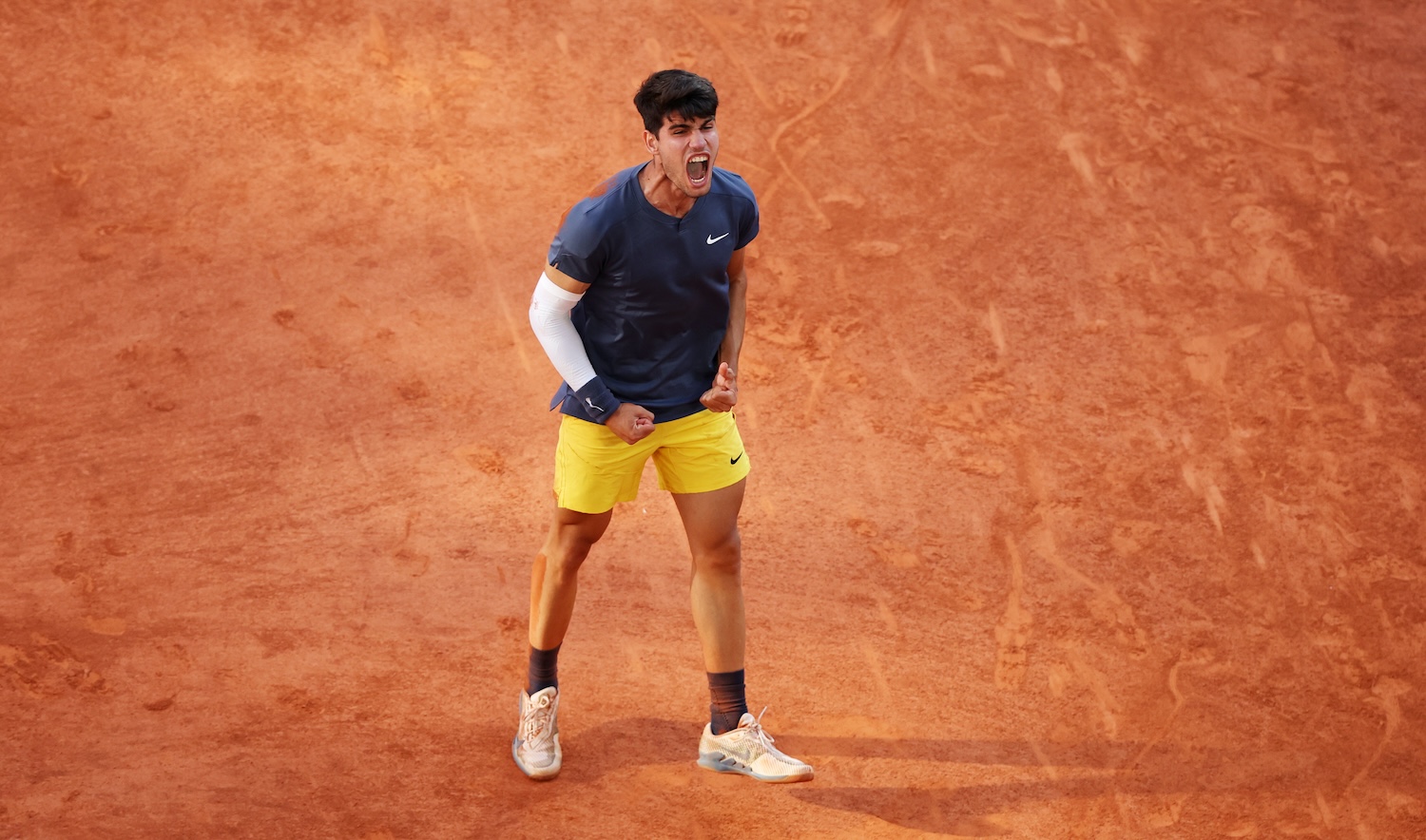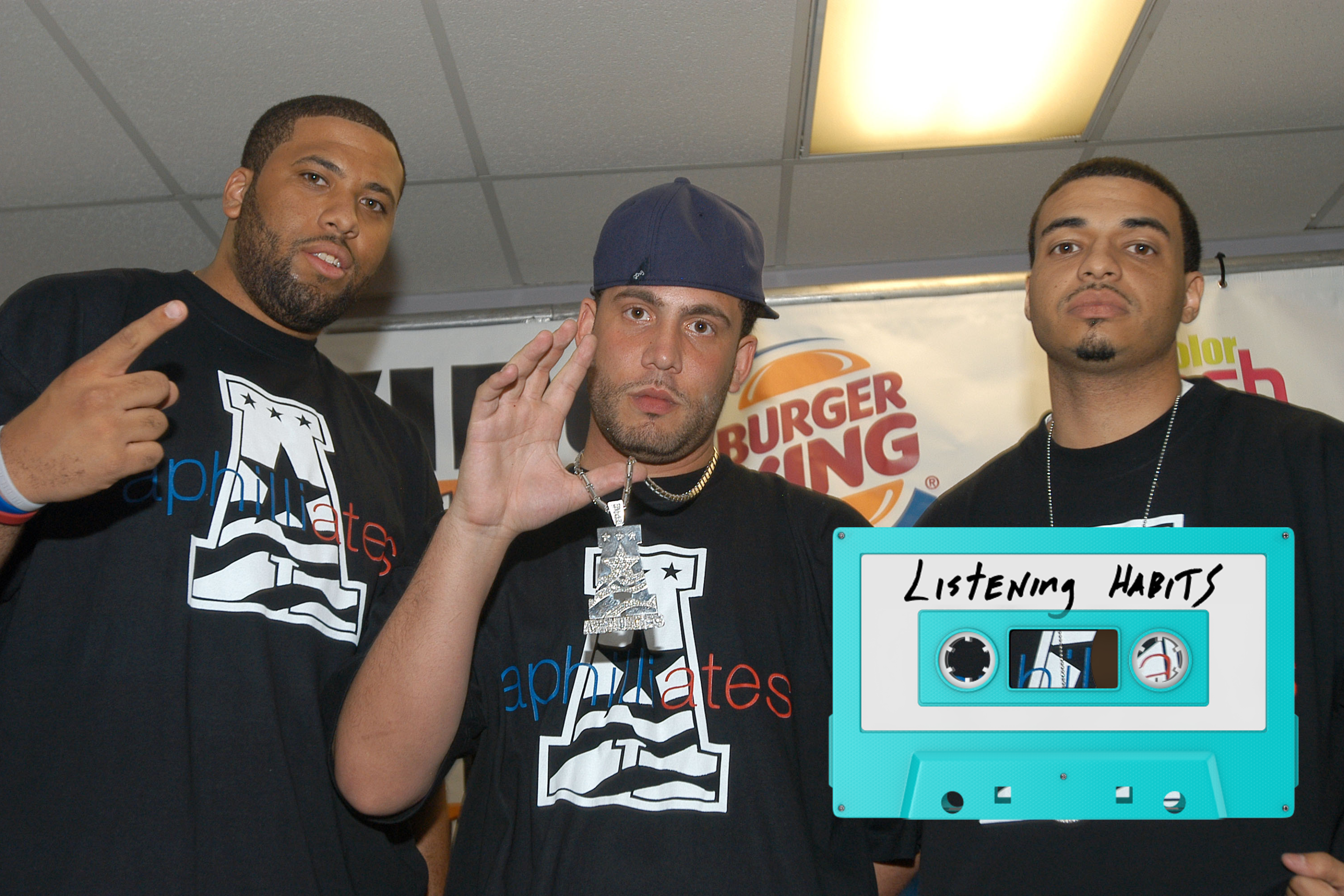The highlights don't always tell the story, though it is hard to shake what I saw in the second game of the fourth set of the French Open men's final. Alexander Zverev had won five games in a row to take the third set, pinging deep, gnarly backhands and confident forehands at Carlos Alcaraz until all he could do was hit moonballs and hope Zverev slipped up. With his back truly against the wall, Alcaraz pulled out his best stuff. At 15-all, Zverev had Alcaraz on the ropes, making contact on a comfortable volley while the Spaniard was sprinting in from outside the doubles alley. Alcaraz hit a corner-to-corner lob right over Zverev's racket.
Alcaraz with the angle 🤩#RolandGarros pic.twitter.com/DNBFF17itq
— Roland-Garros (@rolandgarros) June 9, 2024
When Zverev was facing a break point, he again had Alcaraz pushed back, this time with a meaty backhand. Again, his volley left Alcaraz an opportunity, albeit a compromised one, and he took it with aplomb, smacking a running forehand winner.
That game was a miniaturized version of the match, which Alcaraz won, 6-3, 2-6, 5-7, 6-1, 6-2 in four hours and 19 minutes. Neither player was at their best for more than a set at a time, with Zverev incapable of playing at the net and Alcaraz incapable of serving the ball, yet Alcaraz seized his first Roland Garros title because he rose to meet the moment when things were direst. In this way, the highlights actually do capture the spirit of the match, which is that of a hypercompetitor, someone who gleefully accepts the fight and the suffering of tennis, someone whose every synapse and sinew aligns with brutal purpose under the most crushing pressure. Where Alcaraz's nasty 60 percent first-serve (compared to Zverev's 73 percent) and his 56 unforced errors (compared to Zverev's 41) don't tell the story, his touch of genius does.
It is not always obvious that Alcaraz can be that sort of player, or that he can win a match with these stakes while scuffling that hard. His groundstrokes are deep enough and hard enough that he can blow most lesser players out without having to get too creative, though against top-10 opponents who can hang with him in longer exchanges, it's ingenuity and bravery that set him apart. The platonic ideal of an Alcaraz final is Wimbledon 2023, a five-set hero's journey where he defeated Novak Djokovic by adeptly problem-solving his way to the perfect mix of aggression and restraint, figuring out where his openings were and how to exploit them in realtime. This match's quality was not on that level, though as it is the first of Alcaraz's three Slams that he has won without being at his peak, I find myself almost equally impressed by it.
One month ago, the idea of Alcaraz winning in Paris seemed a distant fantasy. His entire clay season had been derailed by a forearm injury, one that forced him to pull out of Monte Carlo, lose in Madrid, and skip Rome. It is one thing to show up at a Major renewed and healthy after taking it easy in the pre-tournament run-up, though as Jasmine Paolini's run to the women's final showed, there's value in building your way into big tournaments like this. After an uncharacteristically wobbly second-round match against Jesper de Jong, Alcaraz seemed to play his way into form against Sebastian Korda and Felix Auger Aliassime, though the nervous semifinal against Jannik Sinner showed how far Alcaraz was from his peak. Sinner was worse than Alcaraz in that match, though the amount of time it took him to get through and the long stretches of inaccurate, clunky play made me nervous that Zverev, who'd played a pair of five-set epics yet won his quarterfinal and semifinal in a combined seven sets, would be both better-rested and more on-form.
Zverev entered the final days after reaching an agreement to settle an abuse case he was actively on trial for in Germany. Zverev has been accused of abuse by two former partners, including his daughter's mother Brenda Patea, who said he pushed her against a wall and choked her in 2019 and 2020 when they were together. A German court issued a penalty order for bodily abuse against Zverev in Oct. 2023, a ruling he appealed. When asked about reaching a settlement before seeing the appeal all the way through, a defiant Zverev scoffed, "That is innocence. They’re not going to drop the case if you are guilty. Don’t know what translations you have, but that’s what it means. Done. We move on. I never want to hear another question about this subject again." As Giri noted in February, tennis has neither a strong central authority interested in exercising any meaningful discipline, nor a press corps interested in holding Zverev to account, which meant the specter of Zverev winning in front of the (bizarrely supportive) French crowd would be spun, nauseatingly, as a redemption arc.
For two sets, he played like he was intent on completing that arc. After dropping the first set as Alcaraz dictated every point, Zverev found his serve and punished Alcaraz with brutal efficiency in the second. Alcaraz went up a break in the third, only to lose his nerve right as Zverev came charging back. He was at his best over that five-game run, crushing first serves, pinning Alcaraz to the baseline with deep shots, and punishing every Alcaraz misstep. At his best, Zverev is a pretty simple player. He's one of the best servers on tour, and his backhand can hold up against anyone. There's not much sauce to his game, merely a steady level of power and generous wells of endurance.
Alcaraz met that power and endurance in the fourth and fifth sets, and though he scored an early break in the fifth, every Alcaraz service game was an exercise in Carlitos demanding tougher battles simply so he could show he was the strongest guy. He showed Zverev 23 break points, seven more than Alcaraz earned against the German and only one fewer than the total number of break points he faced in the previous four matches. Alcaraz saved 17 of them, including four on an outrageous 3-1 hold that began with him falling into a 0-40 hole. Again, the version of Alcaraz that gives his opponent that many opportunities to break his serve might not be peak Alcaraz, but the guy who saves 17 of them is a different sort of impressive. True to form, he took control of the match for good with a moment of stupendous ingenuity while chasing after the point.
ARE YOU KIDDING ME?!#RolandGarros @carlosalcaraz pic.twitter.com/PNbDGJwQtt
— Roland-Garros (@rolandgarros) June 9, 2024
Performances like that skirt the realm of cliché; there are more artful ways to marvel at Alcaraz's competitive mindset without evoking notions of the heart of the champion, though he's earned the blush-worthy honor. With the title, Alcaraz became the youngest man to win Majors on all three surfaces. He is 3-0 in Grand Slam finals, and now 11-1 in fifth sets. That speaks to his ability not to resist pressure, necessarily, but to thrive in it. He is only 21, so early into what will hopefully be a very long career that the major narratives about who he is and what makes him special are still being compiled. That career will surely be defined by what he pulls out under extreme duress. There is no reason not to believe he's up for it.






